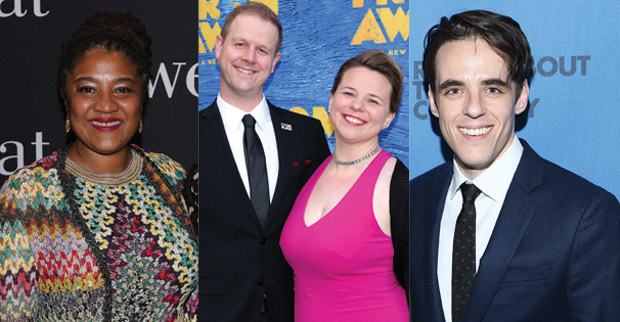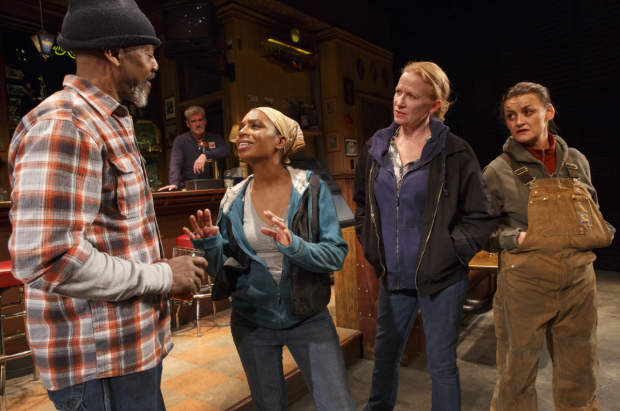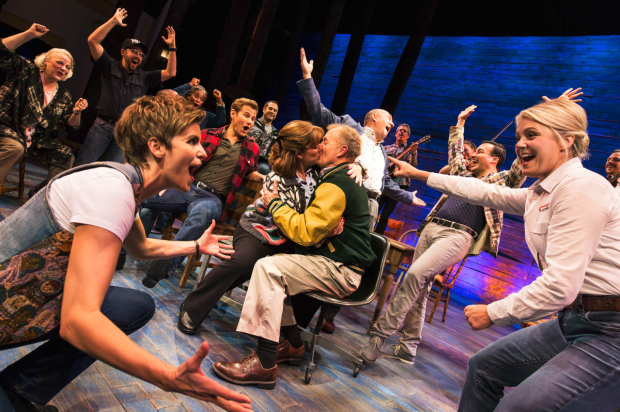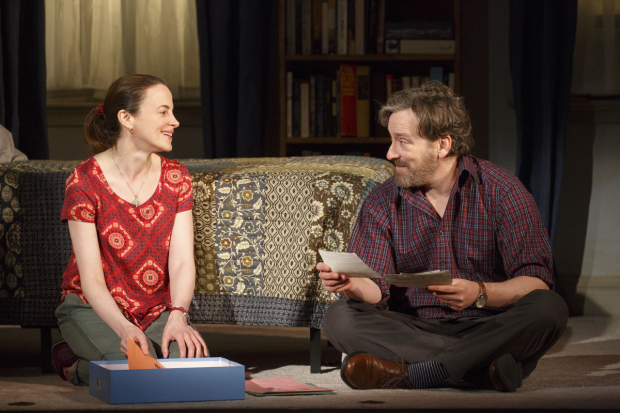Millennium Approached: Looking Back on the 2000s With Sweat, If I Forget, Come From Away
It might be 2017, but the theater is exploring the recent past in order to make sense of the present.
The United States was standing on a precipice when midnight neared on December 31, 1999. As the prosperous '90s ended, the economy was booming, the national unemployment rate was at its lowest in 30 years, and the country was getting ready to say farewell to President William Jefferson Clinton. When the clock struck midnight on January 1, 2000, the Y2K bug didn't actually hit, and everyone continued to party.
The year 2000 was very similar to now on Broadway. Patti LuPone was on the boards (in a concert called Matters of the Heart, not War Paint). A pair of well-received actors were performing a classic and switching roles each night (Philip Seymour Hoffman and John C. Reilly in True West, as Laura Linney and Cynthia Nixon do now in The Little Foxes). And a shocking election cycle ushered in a somewhat unexpected new president.
As Tony Kushner wrote in his seminal 1992 drama Angels in America, "History is about to crack wide open." And on a sunny Tuesday morning in September 2001, it did.

(© David Gordon/Tricia Baron)
It's taken nearly two decades, but writers are finally starting to unpack the turn of the last millennium, an era that playwright Lynn Nottage believes "defined the culture," and seems to have set the path for our current one.
"I think sometimes you need distance to reflect," says Nottage — whose 2017 Pulitzer Prize-winning drama Sweat is running at Studio 54 — when asked why a plethora of work set during this time period is only now coming to light onstage. "When you're in the midst, you can't totally understand what's happening. You're just trying to survive and negotiate that space. Once you have distance, you can look back and say, 'Now I see.'"
Sweat, along with Steven Levenson's If I Forget at the Laura Pels Theatre, is set in 2000. Irene Sankoff and David Hein's musical Come From Away at the Schoenfeld Theatre takes place during a defining week in 2001. These three productions examine a time of transition. "The excitement and the buoyancy of the '90s was over," Levenson says, "and it felt like a new era was beginning. But we didn't know what it was going to be."
The Past

(© Joan Marcus)
Set throughout the year 2000, with flash-forwards to 2008, Sweat explores the lives of blue-collar workers on the cusp of losing their factory jobs to outsourcing in Reading, Pennsylvania. "In that eight-year period," Nottage says, "a great deal happened to change the texture of our culture economically." She had heard about Reading through a newspaper article. "I thought that was interesting that a city in the northeast so close to Philadelphia and relatively close to New York was deemed the poorest city of its size in America."
Several factors accounted for the job losses in the city. With the closure of the Reading railroad station, she says, "transportation left, which meant people couldn't easily get out or get in. The North American Free Trade Agreement (NAFTA) allowed manufacturers to move jobs to factories down south or to Right-to-Work states. There was a bleeding of jobs. I wanted to see the impact of something like NAFTA in that region."
If I Forget takes place at the end of 2000 and at the beginning of 2001. The play follows a liberal Jewish studies professor whose work, which questions Jewish identity, history, and the Holocaust, raises controversy and creates a deep rift in his family.
"I wanted to set the play at an inflection point in the journey of the Jews in America," says Levenson, who also penned the book for this season's Dear Evan Hansen. "The year 2000 was a point that stood out because it was when the Camp David peace accords, the second attempt, collapsed. As a kid growing up in the '90s, it felt like the Middle East peace process was leading to a positive outcome. With the collapse of those peace talks, it seemed like all of that optimism was stripped away. It felt like a moment of reckoning for what it meant to be Jewish, and what it meant to be American."
His choice to set the play just before 9/11 was a practical one: "Michael [played by Jeremy Shamos] wants history to be over in some ways. And it feels like what 9/11 did without a doubt is to make us all realize that history was not finished with the United States. I'd grown up after the Cold War, and it felt like war wasn't something that was going to happen to me. That was such a traumatic moment, for a lot of reasons."

(© Matthew Murphy)
The trauma of 9/11 is center stage in Come From Away, but the musical looks at the world-changing events of that day in a different manner, one that provided hope. Set in Gander, Newfoundland, a small Canadian city with a population of roughly 10,000, it is the story of a town that takes in more than 6,000 passengers from 38 flights that were diverted from American airspace in the immediate aftermath of the September 11 attacks. Sankoff and Hein's musical explores the small acts of kindness the "Ganderites" provide to the displaced people during that fateful week.
Sankoff and Hein, a married Canadian couple, were in New York that day. "We lived at International House, a residence for students around the world," says Sankoff. "We felt that our experience was similar to those in Gander, because we were surrounded by people from other countries." The pair received a grant from the Canadian government to travel to Gander on the 10th anniversary of 9/11, where they interviewed the denizens, passengers, and airline personnel of those flights and began writing their musical. "Knowing that these people so far away were taking care of other people while they were scared was very inspiring to us."
While these turn-of-the-millennium inspirations were very different, their emotional cores are easily reminiscent of the events taking place on world stages today.

(© Joan Marcus)
The Present
"I cannot believe that my own sister voted for George Bush," say Michael, played by Shamos in If I Forget. "Just because you disagree with my opinions doesn't mean that you're right and I'm wrong," replies Sharon, played by Maria Dizzia.
"You didn’t vote for Gore either," says Sharon a bit later.
"Well, I didn't think he was going to lose."
Sound familiar? To audience members it does, and this exchange elicits gasps night after night.
"In September," recalls Levenson, "when I got together with Dan Sullivan to talk about the play, I remember that I was concerned about how this play would feel in February after Hillary Clinton had won the election. And then I remember saying to Dan, 'On the other hand, if Trump wins…' And we both sort of laughed. At that point, nobody thought about the possibility."
The events and characters of Sweat, which opened at the Public Theater just days before the 2016 election, became even more important immediately after. Some audience members went as far as to call Nottage prescient in her depiction of middle-American unhappiness, a descriptor she disagrees with: "I think it's just being awake and being alert and being responsible as an artist. Not ignoring the reality and pretending that this isn't going on."
And people are seeing themselves in the mirror held up by the theater. At the opening-night performance of Come From Away, the audience was on its feet before the show even ended, which surprised its writers. "The response to the show has always been warm," notes Hein, "and we always say there's never a bad time to tell a story about human kindness. But I think there's something more resonant now." It also has the power to bring people together. Days after the opening, Canadian Prime Minister Justin Trudeau took in a performance, with Ivanka Trump as one of his guests.
While all of these productions are set at a particular time, Nottage, for one, is reluctant to call her play a "period piece" just yet. Rather, she considers Sweat "recent history that has contemporary resonance." Not unlike Arthur Miller’s Death of a Salesman, which, Nottage points out, "wasn't a period piece. It was contemporary." Just like Sweat, just like If I Forget, just like Come From Away, three works that are set nearly 20 years ago, but whose subjects still ring true today and, similar to Salesman, will likely continue to feel that way for decades to come.












